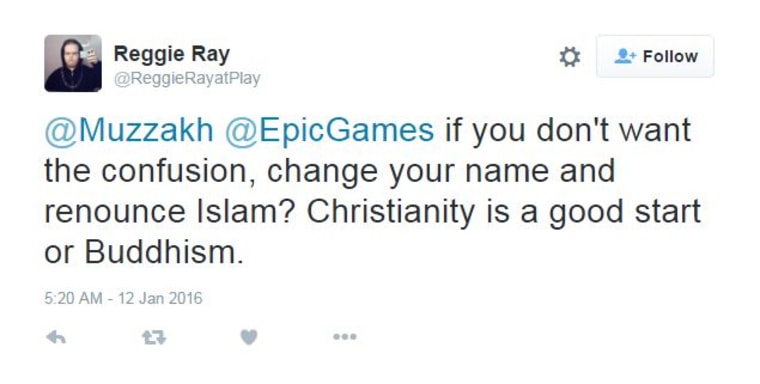Muhammad Zakir Khan, an assistant professor of speech communication at Florida’s Broward College, wanted to play the multiplayer online video game "Paragon." But when he tried to create an account on Sunday, a message popped up on his screen saying he had been blocked.
The problem? He was told he couldn't create an account "as a result of a match against the Specially Designated Nationals List maintained by the United States of America’s Office of Foreign Assets Control."
"I was thinking, 'Am I getting hacked right now? Is this some really cruel joke?" Khan, who was born in the U.S., told NBC News.
He wasn't actually on the list; someone else with the same name from Pakistan was on it. According to the U.S. Treasury Department, it's designed to block "terrorists and narcotics traffickers" from doing business with people in the United States.
In a series of tweets, Tim Sweeney, founder of Epic Games, the company that makes "Paragon," apologized and explained that Khan was blocked due to "bad filtering code" required by "U.S. trade restrictions."
He wrote that Epic Games originally used the code for "paid commercial access" to its "Unreal Engine 4" game engine, and then simply reused it for "Paragon." The code will be reworked, he said, to not block people based solely on their name.
Related: Failsafe: A New Kind of Video Game With Adventure and Diversity
Incidents like this "happen fairly often," according to Shirin Sinnar, an assistant professor at Stanford Law School. That is because the Treasury Department's Office of Foreign Assets Control (OFAC) list has nearly 6,000 names on it, she told NBC News, many of them "extremely common Latino and Muslim names."
Most of the false matches involve financial institutions, which don't want to be accused of funding and profiting from terrorists and drug cartels. (Both HSBC and Wachovia were accused in the past of handling money for illicit organizations).
But the law is "extremely broad," Sinnar told NBC News. "The law essentially says that no U.S. person — your hairstylist, the corner grocery store — is allowed to engage in any transaction with anyone on this list."
People aren't getting thrown in jail for selling shampoo to terrorists. But to avoid even the possibility of fines, some companies screen against the Specially Designated Nationals List with software that looks for name matches.
"Sometimes, companies don't even know what the list is about," she said. "They are depending on some product that, in some automated way, offers OPAC screening as one of its features."
Only the individuals on the list are banned, not the people who share their names. But verifying that information with the Treasury Department takes more work than simply blocking people.
"We're working to figure this out," Sweeney of Epic Games wrote in a tweet. "Ideally, not at signup, but by matching name and billing address at purchase time."
Khan isn't satisfied. He has registered with many other video game companies, including Blizzard, Origin and Steam, and never been blocked because of his name.
"I feel like I deserve a more nuanced response from them," he said of Epic Games.
It's hard to tell how many Internet companies screen against the list, but it's probably not as ubiquitous as in the banking industry, Sinnar said, or else "we would be hearing about a lot more cases of name matches."
Certainly, some do it, and Khan would like to see companies be more transparent about it. He has received a lot of support since tweeting about his experience, but also plenty of hate.

"Video games are a place you would expect to feel safe and protected from these things," Khan told NBC News. "If this happened to a kid, are they supposed to feel there is something wrong or illegal about who they are?"
